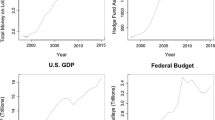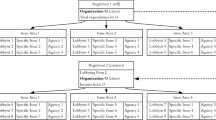Abstract
Interest groups spend large sums of money hiring lobbyists often as a form of insurance against the risk of undesirable policy change. This theory of lobbying as political insurance needs systematic testing. Previous experience serving in government makes lobbyists more valuable as providers of political insurance. The insurance theory of lobbying thus points to an empirical link between policy uncertainty and interest groups’ demand for these “revolving-door lobbyists” with previous government experience. I examine this link using complementary sets of panel analysis of lobbying activity by companies in four economic sectors over an 11-year period. They draw on a sector-specific and time-variant measure of policy uncertainty based on analyzing companies’ discussions of policy risks in annual 10-K filings submitted to the US Securities and Exchange Commission. In all four sectors companies’ preference for revolvers increases in response to policy uncertainty relative to conventional lobbyists.
Similar content being viewed by others
Notes
Bertha Coombs, “Humana turns to game theory for new Medicare pricing as insurers juggle Trump rebate uncertainty,” CNBC, March 22, 2019, https://www.cnbc.com/2019/03/22/humana-turns-to-game-theory-for-new-medicare-price-structure.html.
I follow a semi-automated procedure to match lobbying clients with US companies. The first step is finding the best match for each client among all companies in the Compustat data based on Levenshtein string distances, a commonly used string metric for measuring the difference between two word strings based on single-character edits (i.e., insertions, deletions, or substitutions) required to change one word string into the other. The second step is human determination of whether each match was correct.
Originally in text form, this variable has two known deficiencies, both of which I address somewhat in my variable construction. The first deficiency is that sometimes lobbyists incorrectly thought this field required them to disclose their current positions as lobbyists (e.g., Senior Partner, CEO, Director of Government Affairs) (Drutman and Furnas 2014). I mostly fix this issue by considering only those lobbyists that entered 20 or more characters in the “covered position” field to be revolving-door lobbyists. The second deficiency is some lobbyists’ deliberate underreporting of previous government employment (LaPira and Thomas 2012). While I have no sure-fire solution to truly address this problem, I take advantage of the fact that lobbyists were given an opportunity to disclose previous government employment every time they filed a lobbying report. I may have addressed the problem of deliberate underreporting to some degree by aggregating all text entered by each lobbyist in all lobbying reports over the years of the LDA data.
My determination of the top four sectors in terms of lobbying is based on the average number of clients in each sector over the years. This ranking is in strong agreement with the Center for Responsive Politics’s ranking of sectors based on lobbying expenditure, available at https://www.opensecrets.org/lobby/top.php?showYear=a&indexType=i. Currently, the top four sectors according to the CRP are Pharmaceuticals/Health Products, Insurance, Electric Utilities, and Electronics Manufacturing and Equipment.
Why I adopt this sampling procedure rather than sampling from all publicly traded companies warrants a note. The main reason is that it aims at estimating policy uncertainty as perceived by companies that lobbied, based on the speculation that companies that never lobbied at any point in time and therefore never entered the lobbying data are likely systematically different from lobbying clients, including perceiving policy risks differently. As the analysis excludes the numerous companies that never lobbied, so should the process of generating the measure of perceived policy uncertainty. A secondary reason is practical: Between 10 and 25 percent of all companies lobbied, depending on the sector. As the process of matching lobbying clients with companies and collecting 10-K filings for correctness was relatively time-consuming and labor-intensive, I sample from companies that lobbied to quickly accumulate a sufficient number of them. This process is equivalent to randomly sampling from the intersection of public companies and lobbying clients.
The relevant words and word stems are “govern,” “feder,” “congress,” “agenc,” “court,” “administr,” “commiss,” “legisl,” “legislatur,” “polici,” “penalti,” “fine,” “law,” “regul,” “regulatori,” “zone,” “licen,” “licens,” “licensor,” “oversight,” “complianc,” “compliant,” “noncompli,” “enforc,” “unenforc,” “requir,” “pursuant,” and “protect.” I follow other conventional steps in text analysis: “Stop words” and very sparse words that appear in only 10% or less of all the filing excerpts were removed before counting the key words and word stems. See Supplementary Material: Appendix 1 for a full delineation of the process.
While I use sector-wide measures in my main analysis, I show company-level regression analysis, part of which draws on company-level perceptions of policy uncertainty, in Supplementary Material: Appendix 5.
This increase in the number of policy words translates into a percentage change from 3.4 percent to 3.8 percent because the median overall length of risk factor discussions also increased from 6336 words in 2009 to 7689 words in 2010 for the insurance sector.
References
Austen-Smith, David. 1995. Campaign Contributions and Access. American Political Science Review 89(3): 566–581.
Baker, Scott R., Nicholas Bloom, and Steven J. Davis. 2016. Measuring Economic Policy Uncertainty. The Quarterly Journal of Economics 131(4): 1593–1636.
Ban, Pamela, Maxwell Palmer, and Benjamin Schneer. 2019. From the Halls of Congress to K Street: Government Experience and Its Value for Lobbying. Legislative Studies Quarterly 44(4), 713–752.
Baumgartner, Frank R., Jeffrey M. Berry, Marie Hojnacki, Beth L. Leech, and David C. Kimball. 2009. Lobbying and Policy Change: Who Wins, Who Loses, and Why. Chicago: University of Chicago Press.
Beatty, Anne, Lin Cheng, and Haiwen Zhang. 2018. Are Risk Factor Disclosures Still Relevant? Evidence from Market Reactions to Risk Factor Disclosures Before and After the Financial Crisis. Contemporary Accounting Research 36(2), 805–838.
Bertrand, Marianne, Matilde Bombardini, and Francesco Trebbi. 2014. Is It Whom You Know or What You Know? An Empirical Assessment of the Lobbying Process. American Economic Review 104(12): 3885–3920.
Bombardini, Matilde, and Francesco Trebbi. 2012. Competition and Political Organization: Together or Alone in Lobbying for Trade Policy? Journal of International Economics 87(1): 18–26.
Campbell, John L., Hsinchun Chen, Dan S. Dhaliwal, Lu Hsin-min, and Logan B. Steele. 2014. The Information Content of Mandatory Risk Factor Disclosures in Corporate Filings. Review of Accounting Studies 19(1): 396–455.
Doran, Kevin L., and Elias L. Quinn. 2008. Climate Change Risk Disclosure: A Sector by Sector Analysis of Sec 10-K Filings from 1995–2008. The North Carolina Journal of International Law and Commercial Regulation 34: 721.
Drutman, Lee 2015a. Offensive Lobbying. http://bostonreview.net/state-nation/lee-drutman-offensive-lobbying.
Drutman, Lee. 2015b. The Business of America Is Lobbying: How Corporations Became Politicized and Politics Became More Corporate. Oxford: Oxford University Press.
Drutman, Lee, and Alexander Furnas. 2014. https://sunlightfoundation.com/2014/01/21/revolvers-dollars-methodology-and-cautions/.
Fouirnaies, Alexander, and Andrew Hall. 2015. The Exposure Theory of Access: Why Some Firms Seek More Access to Incumbents Than Others. Available at SSRN 2652361. https://papers.ssrn.com/sol3/papers.cfm?abstract_id=2652361.
Gaulin, Maclean Peter. 2017. Risk Fact or Fiction: The Information Content of Risk Factor Disclosures. https://scholarship.rice.edu/bitstream/handle/1911/96089/GAULIN-DOCUMENT-2017.pdf?sequence=1&isAllowed=y.
Hall, Richard L., and Alan V. Deardorff. 2006. Lobbying as Legislative Subsidy. American Political Science Review 100(1): 69–84.
Huang, Ke-Wei, and Zhuolun Li. 2011. A Multilabel Text Classification Algorithm for Labeling Risk Factors in Sec Form 10-K. ACM Transactions on Management Information Systems (TMIS) 2(3): 18.
Kang, Karam, and Hye Young You. 2016. The Value of Connections in Lobbying. Working paper. http://sticerd.lse.ac.uk/seminarpapers/pspe18102016.pdf.
Kravet, Todd, and Volkan Muslu. 2013. Textual Risk Disclosures and Investors’ Risk Perceptions. Review of Accounting Studies 18(4): 1088–1122.
LaPira, Timothy M., and Herschel F. Thomas. 2012. Revolving Doors: Lobbyists’ Government Experience, Expertise, and Access in Political Context. In APSA 2012 Annual Meeting Paper. https://papers.ssrn.com/sol3/papers.cfm?abstract_id=2107222.
LaPira, Timothy M., and Herschel F. Thomas. 2017. Revolving Door Lobbying: Public Service, Private Influence, and the Unequal Representation of Interests. Lawrence: University Press of Kansas.
Lazarus, Jeffrey, Amy McKay, and Lindsey Herbel. 2016. Who Walks Through the Revolving Door? Examining the Lobbying Activity of Former Members of Congress. Interest Groups & Advocacy 5(1): 82–100.
Li, Feng, Russell Lundholm, and Michael Minnis. 2013. A Measure of Competition Based on 10-K Filings. Journal of Accounting Research 51(2): 399–436.
Lohmann, Susanne. 1995. Information, Access, and Contributions: A Signaling Model of Lobbying. Public Choice 85(3–4): 267–284.
Lowery, David, and Kathleen Marchetti. 2012. You Don’t Know Jack: Principals, Agents and Lobbying. Interest Groups & Advocacy 1(2): 139–170.
McCrain, Joshua. 2018. Revolving Door Lobbyists and the Value of Congressional Staff Connections. The Journal of Politics 80(4): 1369–1383.
McLaughlin, Patrick A., and Oliver Sherouse. 2018. RegData Us 3.1 Annual. QuantGov, Mercatus Center at George Mason University, Arlington, VA. https://quantgov.org/regdata-us/.
Rawte, Vipula, Aparna Gupta, and Mohammed J. Zaki. 2018. Analysis of Year-over-Year Changes in Risk Factors Disclosure in 10-K Filings. In Proceedings of the Fourth International Workshop on Data Science for Macro-Modeling with Financial and Economic Datasets, 8. ACM. http://www.cs.rpi.edu/~zaki/PaperDir/DSMM18.pdf.
Salisbury, Robert H., Paul Johnson, John P. Heinz, Edward O. Laumann, and Robert L. Nelson. 1989. Who You Know Versus What You Know: The Uses of Government Experience for Washington Lobbyists. American Journal of Political Science 33: 175–195.
Stephenson, Matthew C., and Howell E. Jackson. 2010. Lobbyists as Imperfect Agents: Implications for Public Policy in a Pluralist System. Harvard Journal on Legislation 47: 1.
Vidal, Jordi Blanes i, Mirko Draca, and Christian Fons-Rosen. 2012. Revolving Door Lobbyists. The American Economic Review 102(7): 3731.
Author information
Authors and Affiliations
Corresponding author
Additional information
Publisher's Note
Springer Nature remains neutral with regard to jurisdictional claims in published maps and institutional affiliations.
Electronic supplementary material
Below is the link to the electronic supplementary material.
Rights and permissions
About this article
Cite this article
Liu, H. Policy uncertainty and demand for revolving-door lobbyists. Int Groups Adv 9, 470–494 (2020). https://doi.org/10.1057/s41309-020-00104-x
Published:
Issue Date:
DOI: https://doi.org/10.1057/s41309-020-00104-x











